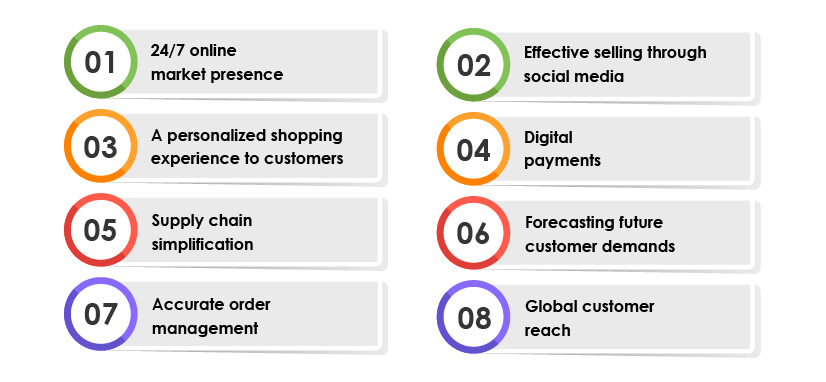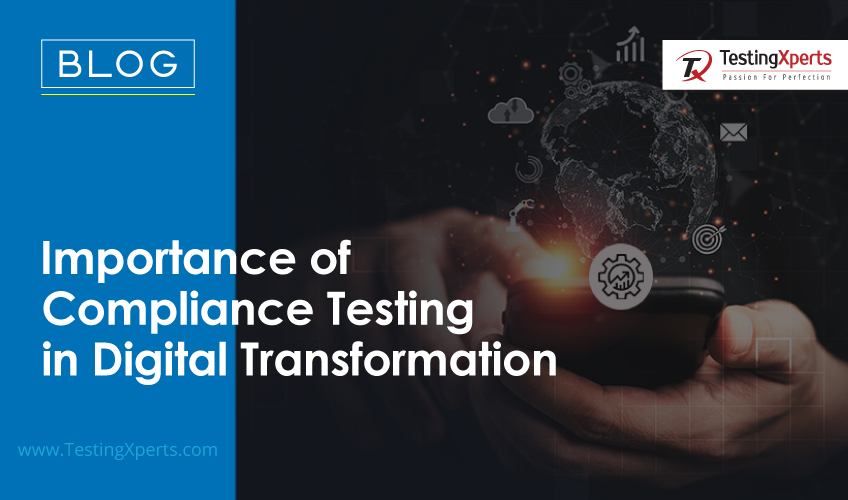
- The Evolving Dynamics of Digital Business
- Understanding Compliance in the Digital Age
- Why Compliance Testing is Crucial for Digital Transformation?
- Challenges in Compliance Testing
- Best Practices for Compliance Testing in Digital Transformation
- Conclusion
- How TestingXperts can help with Compliance Testing?
The business landscape constantly evolves, driven by digital technologies like AI, IoT, ML, Digital twins, etc., redefining how companies operate and deliver value. Digital transformation integrates these digital technologies into all business areas, fundamentally altering operations and customer interactions. This transformation is not merely a technological shift but a significant change in corporate culture and business approach, encouraging ongoing adaptation to digital trends.
The digital transformation process brings with it a set of challenges, particularly in meeting regulatory compliance. Compliance testing ensures digital initiatives comply with legal, ethical, and security standards. It entails thoroughly examining systems and processes to ensure they meet the necessary laws and regulations within a specific industry or region.
The importance of compliance testing in digital transformation cannot be overstated. According to a Gartner survey, regulatory compliance is among the top three concerns for businesses during digital change. Ignoring compliance can lead to substantial risks, including legal repercussions, data breaches, and damage to a company’s reputation, potentially undermining the entire transformation process.
This concern is further amplified by the rising costs associated with data breaches. As reported in IBM’s Cost of a Data Breach Report 2023, the average data breach now costs around USD 4.45 million. The issue extends beyond avoiding financial penalties. It’s about establishing trust with customers and stakeholders in a digital world.
The Evolving Dynamics of Digital Business

Agility, customer-centric approaches, and data-driven decision-making characterize the modern digital business model. Unlike traditional models, it leverages digital tools to optimise operations, enhance customer engagement, and drive continuous innovation. Integrating technologies such as cloud computing, artificial intelligence, and the Internet of Things (IoT) has enabled businesses to operate more efficiently and respond quickly to market changes. This digital-first approach allows exceptional levels of customisation and personalisation in products and services, catering to each customer’s specific needs and preferences.
In this digital era, businesses are not just sellers but service providers, innovators, and partners in the customer journey. The focus has shifted from merely selling products to creating holistic experiences that engage customers at multiple touchpoints. Digital channels are now critical for conducting business, necessitating a seamless omnichannel presence that ensures a consistent and cohesive customer experience across all platforms.
Understanding Compliance in the Digital Age
As businesses evolve with technological advancements, they encounter a range of regulatory requirements and ethical considerations, particularly regarding data privacy. Compliance in this context is essential, serving not just as a legal necessity but as a foundation for building trust and maintaining the integrity of a business.

Regulatory Requirements
Complex and ever-evolving regulatory demands regulate the working of digital business. These vary across industries and regions, covering consumer protection, financial reporting, data security, and more. For example, the General Data Protection Regulation (GDPR) in the European Union has significantly influenced global data protection and privacy standards. Adhering to these regulations is mandatory. Non-compliance can lead to substantial fines, legal consequences, and reputational damage. But compliance is more than avoiding penalties. It’s about safeguarding customers, ensuring fair practices, and contributing to a fair marketplace. Businesses must develop comprehensive compliance strategies that include consistent audits, employee training, and staying updated with regulatory changes.
Ethical and Data Privacy Concerns
Besides legal compliance, ethical behaviour and data privacy is increasingly critical in business operations. How companies manage and secure user data in a data-centric business environment reflects their ethical stance and corporate responsibility. With growing awareness about digital privacy, consumers demand clarity and honesty about how their data is utilized. Respecting data privacy goes beyond fulfilling legal obligations. It’s an essential aspect of building consumer trust. Companies prioritizing ethical data handling and clear communication about their data policies can strengthen customer relationships. This ethical approach also extends to AI and machine learning, where businesses are expected to ensure fairness, unbiased processes, and respect for privacy rights.
Why Compliance Testing is Crucial for Digital Transformation?
Compliance testing is a strategic tool that ensures businesses meet legal standards, build consumer trust, and avoid costly repercussions. Effective compliance testing is vital in safeguarding the company and enhancing its reputation in a competitive digital marketplace.
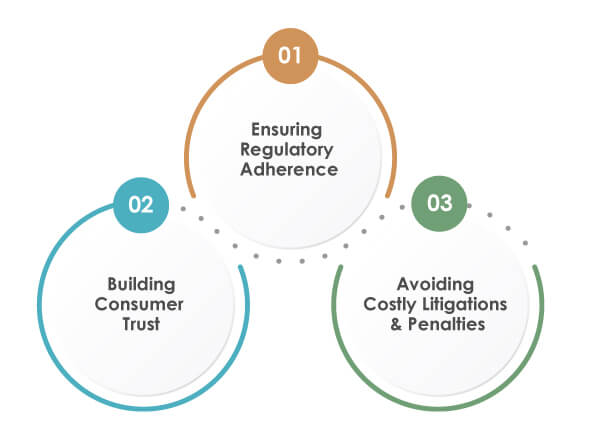
Ensuring Regulatory Adherence
Compliance testing is essential for verifying that a business’s digital operations align with relevant laws and regulations. This process involves thorough assessments to check if the digital products, services, and processes comply with industry standards and legal requirements. It’s a proactive measure that helps identify and rectify compliance issues before they escalate into legal challenges. By ensuring regulatory adherence, businesses protect themselves from legal risks and reinforce their commitment to operating responsibly.
Building Consumer Trust
Compliance testing is crucial in building consumer trust in an era of rampant data breaches and privacy concerns. When businesses demonstrate their commitment to compliance, particularly in handling customer data, they send a strong message about their dedication to privacy and ethical practices. This transparency promotes trust and loyalty among customers, who are more likely to engage with a brand they perceive as reliable and secure.
Avoiding Costly Litigations & Penalties
Non-compliance can result in severe financial consequences, including hefty fines and legal expenses. Compliance testing helps businesses anticipate and address potential legal issues related to their digital practices. By proactively managing compliance, companies can avoid the significant costs associated with violations, which can be detrimental to finances and reputation. Regular compliance testing is a smart investment that helps prevent these negative outcomes and ensures smooth business operations.
Challenges in Compliance Testing
Compliance testing in the context of digital transformation presents a range of challenges. Successfully addressing these challenges is critical for businesses to remain compliant while maintaining efficiency and competitiveness. From adapting to rapidly changing regulations to overcoming specific technical issues and managing global operations, these challenges are diverse and demand strategic attention.
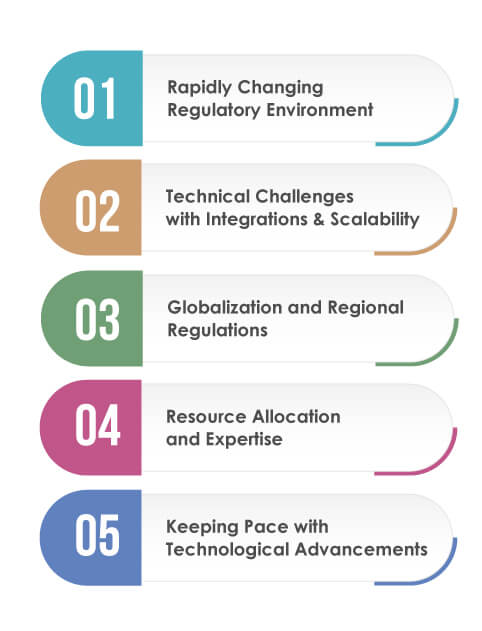
Rapidly Changing Regulatory Environment
A significant challenge in compliance testing is the continuously evolving nature of regulatory landscapes. Laws and standards that govern digital activities are in constant flux, driven by new technological advancements and shifting consumer expectations. Businesses must persistently monitor these changes and adjust their compliance strategies to stay aligned. This ever-changing scenario requires proactive planning and flexibility in implementing compliance measures.
Technical Challenges with Integrations & Scalability
Compliance testing faces technical hurdles, particularly regarding system integrations and scalability. As organizations integrate various digital tools and platforms, ensuring cohesive operation and compliance becomes increasingly complex. Moreover, as a business expands, its systems must scale without compromising compliance, often introducing new challenges.
Globalization and Regional Regulations
Different regional regulations pose a significant challenge for international businesses. A company must adhere to each country’s specific legal requirements, which can be vastly different. This complicates the compliance process and demands a comprehensive understanding of diverse legal frameworks.
Resource Allocation and Expertise
Effective compliance testing requires appropriate resource allocation. Many organizations struggle with dedicating sufficient budget, time, and specialized expertise to their compliance initiatives. The complexity of legal and technical compliance demands specialized knowledge, which can be challenging to acquire and maintain.
Keeping Pace with Technological Advancements
Staying up-to-date with rapid technological progress is another challenge in compliance testing. Technologies like artificial intelligence and blockchain bring new compliance considerations. Businesses must continuously educate themselves and adapt compliance strategies to align with technological trends.
Best Practices for Compliance Testing in Digital Transformation
Adopting best practices in compliance testing is vital for businesses undergoing digital transformation. These practices ensure adherence to regulatory requirements and enhance the compliance process’s efficiency and effectiveness. By implementing strategic measures such as continual monitoring, automation, and team training, organizations can resolve the complexities of compliance with greater confidence and precision.
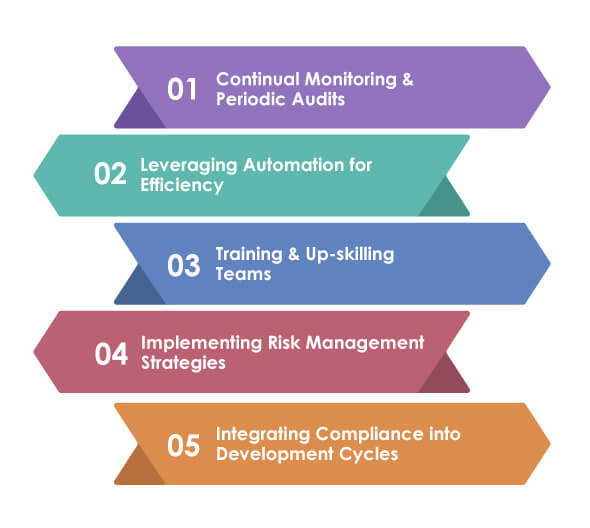
Continual Monitoring & Periodic Audits
Regular monitoring and periodic audits are fundamental for maintaining compliance. Continual monitoring ensures ongoing adherence to regulations, while audits provide a more in-depth compliance status review. These practices help identify potential compliance issues early, allowing for timely corrective actions.
Leveraging Automation for Efficiency
Automation plays a crucial role in enhancing the efficiency of compliance testing. Organizations can focus on complex compliance aspects by automating repetitive and time-consuming tasks. Automation tools can streamline processes, reduce human error, and provide consistent, reliable results.
Training & Up-skilling Teams
Investing in training and up-skilling teams is essential for effective compliance testing. As regulations and technologies evolve, teams must have the latest knowledge and skills. Continuous learning ensures that personnel are competent in handling the dynamic nature of compliance requirements.
Implementing Risk Management Strategies
Incorporating risk management strategies into compliance testing is a technical best practice. This involves identifying potential risks, assessing their impact, and developing mitigation plans. A robust risk management approach ensures that compliance efforts are reactive and proactive in identifying and addressing potential issues.
Integrating Compliance into Development Cycles
Another technical best practice is the integration of compliance considerations into the development cycles of digital products and services. By including compliance checkpoints at different stages of development, organizations can ensure that their offerings are compliant from the outset. This approach reduces the need for extensive modifications later in the process and streamlines the path to compliance.
Conclusion
Digital transformation is not just about adopting new technologies but comprehensive change management. Implementing compliance as a foundational element ensures this transformation occurs within a secure and lawful framework. Businesses that prioritize compliance are safeguarding their operations and gaining a competitive edge. In the fast-paced digital age, staying compliant means staying ahead, ready to seize new opportunities while mitigating risks.
How TestingXperts can help with Compliance Testing for Digital Transformation?

At TestingXperts, we understand the critical role of compliance testing in your path to digital transformation. Our specialized services ensure your business meets regulatory standards and excels in its digital endeavours.
Cutting-Edge Compliance Solutions
Our approach to compliance testing is based on the latest technologies and best practices. We leverage state-of-the-art tools and methodologies to deliver precise and efficient testing results, ensuring your digital solutions comply with industry regulations and standards.
Expert Team with Specialized Knowledge
The TestingXperts team comprises industry experts with extensive knowledge of compliance requirements across various sectors. Our professionals are adept at navigating the complexities of compliance in the digital landscape, providing insights and solutions tailored to your unique business needs.
Tailored Strategies for Digital Compliance
We develop customized strategies aligning with your digital transformation goals. We focus on delivering a compliance framework that integrates seamlessly with your digital initiatives, adding value without hindering innovation.
Advanced Risk Management and Mitigation
Understanding and managing risks is at the core of our compliance testing services. We conduct thorough risk assessments and implement proactive strategies to mitigate potential compliance issues. This approach ensures adherence to regulations and protects your business from possible legal and financial repercussions.
Continuous Compliance Monitoring and Support
In the ever-evolving digital landscape, continuous monitoring is vital to maintaining compliance. TestingXperts offers ongoing support and monitoring services, keeping you updated with the latest regulatory changes and ensuring your digital solutions remain compliant.
To know more, contact our experts now.
Discover more
Get in Touch
Stay Updated
Subscribe for more info




